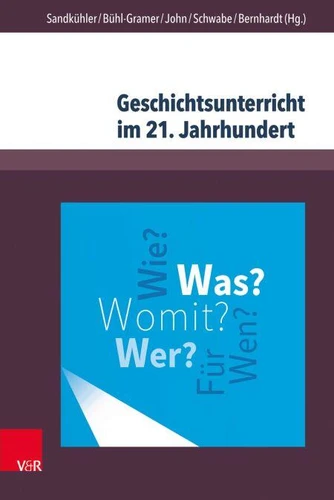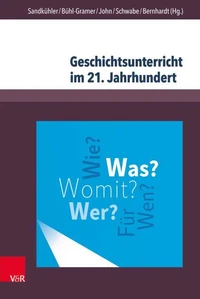- Accueil /
- Charlotte Bühl-Gramer
Charlotte Bühl-Gramer

Dernière sortie
Geschichtsunterricht im 21. Jahrhundert
Um den vielfältigen Herausforderungen des Geschichtsunterrichts gerecht zu werden, ist eine geschichtsdidaktische Bestandsaufnahme des historischen Lernens in der Schule unabdingbar. Ziel ist es, den schulischen Geschichtsunterricht fachlich zu profilieren, wissenschaftlich zu reflektieren und pädagogisch zu verbessern. Denn der Geschichtsunterricht ist von hoher bildungspolitischer Relevanz, wie wiederholte öffentliche Debatten in Deutschland und seinen Nachbarländern gezeigt haben.
Was bedeutet historisches Lernen in der Schule? Für wen wird Geschichtsunterricht eigentlich gestaltet? Diese und andere Fragen adressiert die Konferenz für Geschichtsdidaktik an den Geschichtsunterricht und nimmt hierbei auch die schulische Praxis und ihr politisches Umfeld in den Blick. In order to meet the various challenges of history education, a historical-didactical survey of historical learning in schools is essential.
The aim is to design the history education in school professionally, to reflect it scientifically and to improve it pedagogically. History education is highly relevant for education policy as could be seen in many public debates in Germany and its neighbouring countries. What does historical learning mean in school? Who do we design history education for? The conference for history didactics addresses these questions on history education and also focuses on the practices in schools and its political environment.
Was bedeutet historisches Lernen in der Schule? Für wen wird Geschichtsunterricht eigentlich gestaltet? Diese und andere Fragen adressiert die Konferenz für Geschichtsdidaktik an den Geschichtsunterricht und nimmt hierbei auch die schulische Praxis und ihr politisches Umfeld in den Blick. In order to meet the various challenges of history education, a historical-didactical survey of historical learning in schools is essential.
The aim is to design the history education in school professionally, to reflect it scientifically and to improve it pedagogically. History education is highly relevant for education policy as could be seen in many public debates in Germany and its neighbouring countries. What does historical learning mean in school? Who do we design history education for? The conference for history didactics addresses these questions on history education and also focuses on the practices in schools and its political environment.
Um den vielfältigen Herausforderungen des Geschichtsunterrichts gerecht zu werden, ist eine geschichtsdidaktische Bestandsaufnahme des historischen Lernens in der Schule unabdingbar. Ziel ist es, den schulischen Geschichtsunterricht fachlich zu profilieren, wissenschaftlich zu reflektieren und pädagogisch zu verbessern. Denn der Geschichtsunterricht ist von hoher bildungspolitischer Relevanz, wie wiederholte öffentliche Debatten in Deutschland und seinen Nachbarländern gezeigt haben.
Was bedeutet historisches Lernen in der Schule? Für wen wird Geschichtsunterricht eigentlich gestaltet? Diese und andere Fragen adressiert die Konferenz für Geschichtsdidaktik an den Geschichtsunterricht und nimmt hierbei auch die schulische Praxis und ihr politisches Umfeld in den Blick. In order to meet the various challenges of history education, a historical-didactical survey of historical learning in schools is essential.
The aim is to design the history education in school professionally, to reflect it scientifically and to improve it pedagogically. History education is highly relevant for education policy as could be seen in many public debates in Germany and its neighbouring countries. What does historical learning mean in school? Who do we design history education for? The conference for history didactics addresses these questions on history education and also focuses on the practices in schools and its political environment.
Was bedeutet historisches Lernen in der Schule? Für wen wird Geschichtsunterricht eigentlich gestaltet? Diese und andere Fragen adressiert die Konferenz für Geschichtsdidaktik an den Geschichtsunterricht und nimmt hierbei auch die schulische Praxis und ihr politisches Umfeld in den Blick. In order to meet the various challenges of history education, a historical-didactical survey of historical learning in schools is essential.
The aim is to design the history education in school professionally, to reflect it scientifically and to improve it pedagogically. History education is highly relevant for education policy as could be seen in many public debates in Germany and its neighbouring countries. What does historical learning mean in school? Who do we design history education for? The conference for history didactics addresses these questions on history education and also focuses on the practices in schools and its political environment.
Les livres de Charlotte Bühl-Gramer

Geschichte im interdisziplinären Diskurs. Grenzziehungen – Grenzüberschreitungen – Grenzverschiebungen
Michael Sauer, Charlotte Bühl-Gramer, Anke John, Astrid Schwabe, Alfons Kenkmann
E-book
75,00 €

Geschichtslernen in biographischer Perspektive. Nachhaltigkeit – Entwicklung – Generationendifferenz
Michael Sauer, Charlotte Bühl-Gramer, Anke John, Marko Demantowsky, Alfons Kenkmann
E-book
75,00 €
